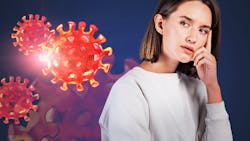Zero antibody response following SARS-CoV-2 vaccination. Who’s at risk?
Who is at risk of not developing an antibody response to the COVID-19 vaccine? Good question. Current data indicates solid organ transplant patients may be at the highest risk of developing a poor antibody response—or none at all. But likely, other individuals who are immunosuppressed due to medications used to treat autoimmune diseases—such as rheumatoid arthritis, Crohn’s disease, ulcerative colitis, individuals with blood cancers, and individuals on various chemotherapies—are also at risk of a reduced or negative antibody response. As of this writing, the Food and Drug Administration (FDA) does not recommend that the public test their antibody responses after receiving a SARS-CoV-2 vaccination,1 so we may not know all of the individuals who are at risk of failing to mount an antibody response for a while or even the implications.
My husband, David, is an immunosuppressed transplant patient. He recently took a serum SARS-CoV-2 antibody test, and it failed to show any antibody response three months after having two COVID-19 vaccinations from Pfizer. This raised a question about the validity of the test, so I elected to take the same serum antibody test. I had also received two COVID-19 vaccinations from Pfizer three months earlier. My test confirmed that I had antibodies against the SARS-CoV-2 virus.
If you choose to be vaccinated, yet discover you failed to develop antibodies to the virus, what is your risk of developing COVID-19? That requires a complicated answer. One might assume that your risk of acquiring COVID-19 is the same as it was before you were vaccinated, with one caveat. As herd immunity rises in the US against the spread of SARS-CoV-2, everyone’s risk is reduced but certainly not to zero. It is important to note that, currently, there is a gap in the literature related to COVID-19 immunity or the lack thereof following vaccination.
A complex issue and a mixed-bag response
Before taking a peek into the science on this topic, I realize there are questions regarding whether COVID-19 vaccinations should be referred to as vaccinations or simply shots. There are also strong opinions on both sides of the issue as to whether an individual should receive a vaccine. We don’t yet have perfect information on this complex issue. As health-care providers, however, it is important to understand what the science reveals at this point.
A recent study published in the Journal of the American Medical Association (JAMA) found that 46% of 658 organ transplant patients did not develop an antibody response after two doses of the Pfizer or Moderna COVID-19 vaccines.2 Dorrey Segev, a researcher at the Johns Hopkins University School of Medicine who was part of the research team, said in the May 18, 2021, edition of the Washington Post, “The overwhelming majority of transplant patients, even after a second dose of the vaccine, appear to have suboptimal protection—if any—from the vaccine, which is frightening, disappointing, and a bit surprising.”3
Following the release of the JAMA study, news media outlets sought interviews with transplant patients and other immunosuppressed individuals who reported no antibodies to the SARS-CoV-2 virus following the prescribed round of vaccines.4 Some of those interviewed found that taking an additional vaccine or changing vaccines boosted their immune system to respond with antibodies, while others did not. Results appear mixed, with no published data directing those failing to develop antibodies to pursue additional vaccinations or switch to another type of vaccine.
Unanswered questions
In conjunction with the JAMA study, the FDA issued a reminder that it is currently unknown just how much antibody response is ideal or necessary.1 Is some response better than none? One would assume so, but are there other considerations at play in development of an immune response following vaccination, such as an improved T-cell count or improved T-cell activity as another aspect of immunity, even if you fail to develop antibodies from the serum antibody tests? After all, detecting antibodies following vaccination is only one assessment of what is involved with development of immunity.
Our immune systems are complex and comprised of innate and acquired immunity, T and B cells, bone marrow, the lymphatic system, and a host of other components not measured in relationship to protection against COVID-19 or other transmissible diseases. Accurately assessing immunity and answers to some of these questions are a few of the conundrums stumping scientists.
It is no surprise that when my husband sought direction from medical experts regarding next steps, they could not advise him how best to proceed as an immunosuppressed individual. Hopefully in the near future, there will be science to guide decisions for those who fail to show an antibody response to the COVID-19 vaccines.
Shortly after we were fully vaccinated, we visited my 92-year-old mother in her independent care facility. Giving her a real hug was indescribable. At that time, it was easy to travel with an increased sense of security knowing we had both been vaccinated. We had not yet considered antibody response or the possible lack thereof. In the dental practice, I find patients who stayed away during the pandemic are returning with increased confidence, and many are eager for hugs after a long year of missing their dental hygiene visits.
However, this information reminds us that not everyone develops a measurable antibody response to the COVID-19 vaccine, and there is much to learn on this topic for the 10 million immunocompromised individuals in the US.4 Stay informed. Follow the science on antibodies and proven strategies to reduce risks for communicable diseases.
Editor's note: This article appeared in the August 2021 print edition of RDH.
References
- Antibody testing is not currently recommended to assess immunity after COVID-19 vaccination: FDA safety communication. U.S. Food and Drug Administration. May 19, 2021. Accessed May 29, 2021. https://www.fda.gov/medical-devices/safety-communications/antibody-testing-not-currently-recommended-assess-immunity-after-covid-19-vaccination-fda-safety
- Boyarsky BJ, Werbel WA, Avery RK, et al. Antibody response to 2-dose SARS-CoV-2 mRNA vaccine series in solid organ transplant recipients. JAMA. 2021;325(21):2204-2206. doi:10.1001/jama.2021.7489
- Cha AE. Coronavirus vaccines may not work in some people. It’s because of their underlying conditions. Washington Post. May 28, 2021. Accessed May 29, 2021. https://www.washingtonpost.com/health/2021/05/18/immunocompromised-coronavirus-vaccines-response/
- Millions taking immunosuppressive medications at risk for reduced response to COVID-19 vaccines [video]. CBS This Morning. YouTube. May 18, 2021. Accessed May 28, 2021. https://www.youtube.com/watch?v=ABijrAwUv_c
Karen Davis, BSDH, RDH, is the founder of Cutting Edge Concepts, an international continuing education company, and practices dental hygiene in Dallas, Texas. She is an independent consultant to the Philips Corp., Periosciences, and Hu-Friedy/EMS. She can be reached at [email protected].
About the Author
Karen Davis, BSDH, RDH
Karen Davis, BSDH, RDH, is the founder of Cutting Edge Concepts, an international continuing education company. She practices dental hygiene in Dallas, Texas. She is an independent consultant to the Philips Corporation, Periosciences, Hu-Friedy Group, and EMS. She can be reached at [email protected].

